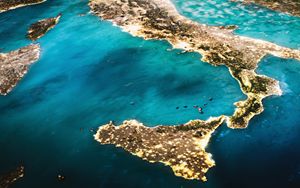(Finance) – The new project work cycle closes “Southward” through which the commitment to build and strengthen the new centrality of the Southern Italy he was born in Extended Mediterranean as a key macro-region for major geo-economic and social challenges of global significance. This is the focus that emerges from the second edition of the White Paper presented during the 2023 edition of the Forum “Towards South” – The European strategy for a new geopolitical, economic and socio-cultural season in the Mediterranean” – scheduled for May 19 and 20 a Sorrento (Grand Hotel Excelsior Vittoria) created by The European House – Ambrosetti with the patronage of the Minister for European Affairs, the South, Cohesion Policies and the PNRR, and the support of the country’s leading economic and financial players such as Intesa Sanpaolo, Ferrovie dello Stato, Philip Morris Italia, MSC Group, Adler Group, Edison, Mediocredito Centrale – Invitalia, Coldiretti.
Expanded the analysis already carried out in 2022, taking into consideration 24 Key Performance Indicators (KPI), over a 10-year horizon for a total of over 15,600 surveyed data, aggregated into four analysis domains (economic, endowment, innovation and culture and social) and summarized in the Mediterranean Sustainable Development Index (MSDI Index), an innovative monitoring index, which this year also integrates the selection of indicators relating to the Sustainable Development Goals defined by the United Nations (SDGs).
In the’MSDI index Southern Italy ranks 5th in the economic domain, 4th in the endowment domain, 7th in the innovation and culture domain and 9th in the social domain. Overall, the results that emerged from the analysis restore the image of a Southern Italy with great potential that currently represents the third economy In the Mediterranean Core (which includes, in addition to Italy, 22 countries of the European Union, the Balkan area, the Middle East and North Africa), with results higher than the reference averages indicated above.
In the macro-sector ofEconomy of the Sea, Southern Italy records a high positioning compared to the rest of the country: in fact, the sector has over 107,000 companies (equal to 47.9% of the national total), 345,000 employees (37.5% of the national total) and generates 15.6 billion euros of added value (equal to 30.4% of the national total). Among all the sectors that make up the sector, port facilities And freight transport And passengers are crucial in supporting the centrality of the ports of Southern Italy.
To support it competitiveness however, it is necessary to invest and intervene in some priority areas: intermodal development and integration of rail transport (only 8 out of 32 ports in the South are connected to the National Railway Infrastructure), digitization (enabling logistical simplifications and red tape), green transition (incentivising example the electrification and the development of small scale LNG) and a better effectiveness of the governance of the port system.
In the context of Energy Sector, Southern Italy is already today the reference energy platform for the Euro-Mediterranean area, playing a key role in the security of the country’s supplies. The South, crossed by the main energy infrastructures, which connect the southern and northern shores of the Mediterranean, Europe and Africa, already represents the reservoir of renewable energies of the country, in 1st place in the Mediterranean for share of consumption covered by renewable energy sources (31.6% of the total).
On the front of Tourism, the margins for improvement mainly concern the international attractiveness of Southern Italy which today attracts only 12.7% of foreign tourists arriving in the country. With 15 national parks (>30% of the national total), 24 marine protected areas (75% of the total), 22 sites protected by UNESCO (38% of the national total) and 175 authentic villages (86% of the Italian total), the tourism sector can grow further.
